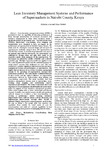Lean Inventory Management Systems and Performance of Supermarkets in Nairobi County, Kenya
Abstract
Lean inventory management systems (LIMS) is
postulated to have the capability of enhancing performance of
firms through minimization of overheads associated with
inventory management in firms where inventory forms a
significant portion of operational costs. Therefore in this study
LIMS(s); just-in-time, cross-docking, drop shipping and
back ordering were theorized to have an impact on the
performance of supermarkets in Nairobi County, Kenya. The
study used of a descriptive research design and surveyed 113
supermarkets randomly sampled from 158 supermarkets in
Nairobi City County. A structured questionnaire was used as
the primary data collection instrument. The questionnaire was
administered through drop and pick later mode to the
respective supply chain managers of the supermarkets. The
instrument was piloted for validity, reliability and to identify
potential gaps. Multiple regression model was applied to test
the study hypothesized model and the statistical package for
social science (version 21.0) facilitated the tests. The tests
established a positive significant link between lean inventory
management systems and performance of supermarkets. This
implies that an increase in use of lean inventory management
systems in the operations of supermarkets, increases their
performance positively. The study further established that just
in time system had the highest influence on supermarkets
performance followed by back ordering, drop picking and
cross-docking respectively. The study concludes that lean
inventory management systems such as just-in-time, cross docking, drop shipping and back ordering improve
supermarket performance. The study recommends that retail
supermarket owners/managers should implement an inventory
policy in support of lean inventory management practices,
define stock keeping units to better understand and forecast
demand. Secondly, supermarket owners should make profound
cultural changes to re-enforce a lean transformation and
develop a performance culture focusing continuous
improvement where staff are always actively discussing and
implementing improvements through either formal or
informal. Finally supermarket owners/managers need to close
the gap by hiring a few people with lean expertise and
experience from outside the retail sector to seed the
transformation and build new internal capabilities in lean
inventory management practices in managing their inventory

